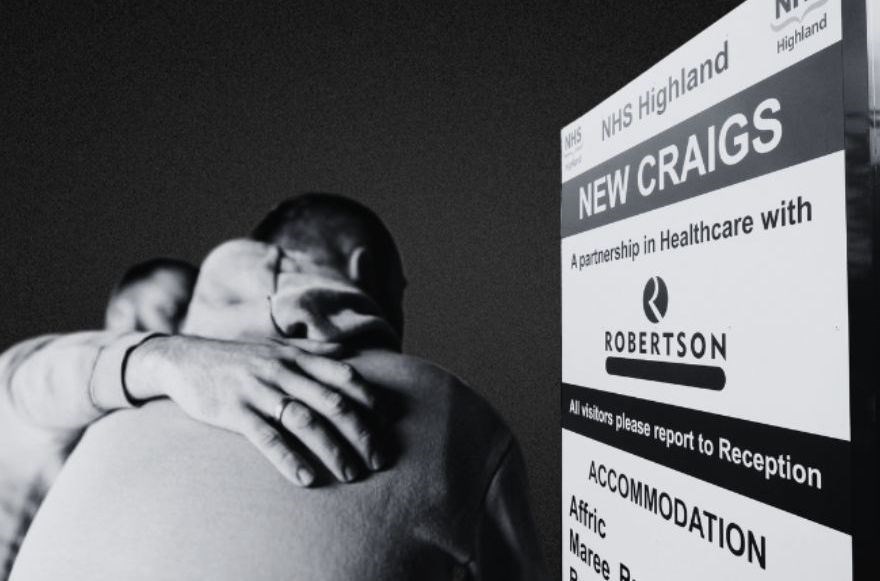Health
Mental Health Clinicians Discuss Impact of Patient Loss

Two prominent mental health professionals from the Highlands have opened up about the emotional toll on staff when a patient takes their own life. The clinicians from New Craigs, the only psychiatric hospital in the region, shared their insights following a tragic incident involving Will Ogilvy, who ended his life in 2024 after being diagnosed with schizophrenia.
His mother, Jacqui Waring, felt compelled to transform her profound loss into a drive for change within the healthcare system. After her son’s death, she collaborated with NHS Highland to advocate for necessary reforms in mental health care, aiming to improve support for patients and their families.
Emotional Burden on Staff
During a recent discussion, Dr. Neil McNamara, clinical director of mental health services, and Jonathan Davies, associate lead nurse for mental health, reflected on the challenges faced by their team. They emphasized that the nature of mental health treatment involves building close relationships with patients, which intensifies the emotional impact when a patient dies.
“What we do is mainly through therapeutic relationships,” Davies explained. “Our whole person goes into battle with our patient against their challenges. When someone dies, the impact on our staff can be much greater than in more mechanical medical procedures.”
Dr. McNamara described the aftermath of losing a patient as both a shock and a tragedy, echoing Davies’ sentiments. “Staff experience the same emotional responses that anyone would recognize. There’s sadness and sorrow for what has been lost, as well as a sense of guilt,” he said. “This burden can affect their health and well-being, leading to a need for additional support.”
Professional Reflection and Growth
Despite the emotional weight, both clinicians acknowledged that such losses are a part of their professional landscape. They stressed the importance of reflecting on these experiences to determine if there were missed opportunities for intervention or ways to strengthen the care provided.
“You have a duty to pause and think about it carefully,” Dr. McNamara stated. “Was it something we could not have predicted? Or did we miss something that needs to be addressed?” This introspection not only aids in personal healing but also contributes to ongoing professional development within the mental health service.
Waring’s engagement with NHS Highland has been pivotal, as Dr. McNamara expressed gratitude for her courage in advocating for change. “It is a very valuable thing given the stigma surrounding mental health,” he remarked. “There are nationally recognized structures for conducting investigations and engaging with families, and we know how effective this dialogue can be.”
Both McNamara and Davies emphasized their commitment to improving their practices, acknowledging that while they strive for excellence, they do not always succeed. “We’re always trying to get better,” Davies concluded.
The conversations at New Craigs highlight the often-overlooked emotional landscape of mental health professionals. By sharing their experiences and insights, clinicians like McNamara and Davies aim not only to support their own well-being but also to enhance the care provided to patients in distress.
-

 Health3 months ago
Health3 months agoNeurologist Warns Excessive Use of Supplements Can Harm Brain
-

 Health3 months ago
Health3 months agoFiona Phillips’ Husband Shares Heartfelt Update on Her Alzheimer’s Journey
-

 Science1 month ago
Science1 month agoBrian Cox Addresses Claims of Alien Probe in 3I/ATLAS Discovery
-

 Science1 month ago
Science1 month agoNASA Investigates Unusual Comet 3I/ATLAS; New Findings Emerge
-

 Science4 weeks ago
Science4 weeks agoScientists Examine 3I/ATLAS: Alien Artifact or Cosmic Oddity?
-

 Entertainment4 months ago
Entertainment4 months agoKerry Katona Discusses Future Baby Plans and Brian McFadden’s Wedding
-

 Science4 weeks ago
Science4 weeks agoNASA Investigates Speedy Object 3I/ATLAS, Sparking Speculation
-

 Entertainment4 months ago
Entertainment4 months agoEmmerdale Faces Tension as Dylan and April’s Lives Hang in the Balance
-

 World3 months ago
World3 months agoCole Palmer’s Cryptic Message to Kobbie Mainoo Following Loan Talks
-

 Science4 weeks ago
Science4 weeks agoNASA Scientists Explore Origins of 3I/ATLAS, a Fast-Moving Visitor
-

 Entertainment4 months ago
Entertainment4 months agoLove Island Star Toni Laite’s Mother Expresses Disappointment Over Coupling Decision
-

 Entertainment3 months ago
Entertainment3 months agoMajor Cast Changes at Coronation Street: Exits and Returns in 2025









